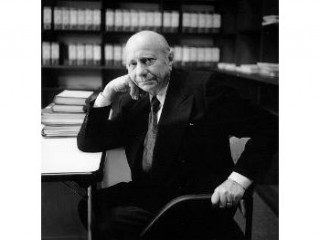
Marc Bloch biography
Date of birth : 1886-07-06
Date of death : 1944-06-16
Birthplace : Lyons, France
Nationality : French
Category : Historian personalities
Last modified : 2011-10-29
Credited as : historian, writer,
The French historian Marc Bloch was the leading French medievalist of the 20th century. He inspired two generations of historians through his teaching and writing.
Marc Bloch was born at Lyons on July 6, 1886, the son of Gustave Bloch, a professor of ancient history. Marc studied in Paris at the Ecole Normale and the Fondation Thiers, in Berlin, and in Leipzig. During World War I he served in the infantry, winning four citations and the Legion of Honor. When the French University at Strasbourg was revived in 1919, Bloch went there to organize the seminar on medieval history. He remained until 1936, when he was called to the Sorbonne to succeed Henri Hauser in the chair of economic history.
In 1920 Bloch presented his thesis Kings and Serfs, in which he tried to discover what freedom and servitude meant in the Middle Ages. It was a question he pondered throughout his career, continuing his investigations in major articles of 1921, 1928, and 1933 and in the pages of his Feudal Society. The thesis was symptomatic of Bloch's interests and sympathies. He saw the problem of liberty and servitude as one involving economic structures and systems of belief as well as legal norms and institutional practices. From then until his death he continued to affirm that history must concern itself with the whole man, that the economic or legal historian must be first of all a historian of civilization.
Bloch's interest in men and their beliefs inspired his second major work, The Magic-working Kings (1924), a study of the supernatural character attributed to kings in the Middle Ages, in particular the belief in their miraculous powers of healing. His interest in men and their works inspired a series of articles on the spread of labor-saving inventions in the Middle Ages, medieval monetary problems, rural land distribution, and many other topics. In all of these, as in a series of lectures, The Original Characteristics of French Rural History (1931), he insisted that the economic and technical questions he was discussing were also questions of "collective psychology."
In 1929 Bloch and Lucien Febvre founded the Annales d'histoire economique et sociale to provide a place for innovative historians to express their views. The two editors made themselves the champions of "history as one of the sciences of man" which the resources of sociology, psychology, economics, medicine, and all other disciplines that study man should be used to serve. Bloch also contributed to the Revue de synthese, whose objective was to overcome the barriers between academic disciplines. His last historical work was Feudal Society (2 vols., 1939-1940), in which he described the legal institutions of feudalism in their broad cultural setting.
In 1939 Bloch was called back to the army. Avoiding capture in the defeat, he found refuge at Gueret, where he wrote a memoir of his war experiences, The Strange Defeat (1946). In this time of forced repose he also set down his reflections on his vocation, The Historian's Craft. The anti-Semitic laws soon forced him to leave the University of Paris for Clermont-Ferrand and then for Montpellier. When persecutions increased, he disappeared into the Resistance. In 1943 he reappeared briefly as "Blanchard," then as "Arpajon," "Chevreuse," and "Narbonne." Captured by the Germans in 1944, he was tortured and, on June 16, shot by a firing squad at Saint-Didier-de-Formans, near Lyons.
















